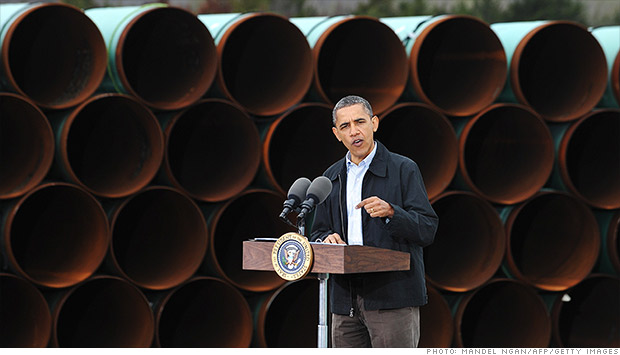
On January 31, the U.S. State Department released its final Environmental Impact Statement regarding the proposed Keystone XL pipeline. If the proposal from Canadian oil corporation TransCanada is approved, construction will begin on the 875-mile pipeline extension that would start in Alberta, Canada before stretching through Montana, South Dakota, Nebraska, Oklahoma, and arriving at Texas’s Gulf Coast. With the capacity to move 830,000 barrels per day (bpd) of Canadian crude oil through American ports, the economic benefit of the pipeline is tantalizing. But in a few significant ways, the decision to deny or approve the Keystone XL pipeline will serve as a defining moment in President Obama’s presidency.
In the realm of public relations, at least, the Obama administration has heightened the offensive against climate change in its second term. The administration has pointed to Superstorm Sandy and 2012’s record-breaking temperatures as evidence of the nation’s need to act. This past June, the President released a comprehensive Climate Action Plan, which tightens federal restrictions on carbon emissions in many industries, and increases funding for clean energy and green technology. With regards to the Keystone XL pipeline, President Obama has declared that he will approve it “only if this project does not significantly exacerbate the problem of carbon pollution.”
In light of the State Department’s Environmental Impact Statement, though, Obama will have to lay his cards on the table. When he declared in 2008 that his presidency would mark “the moment when the rise of the oceans began to slow and our planet began to heal,” did he mean it?
Environmental groups have raised many objections to the pipeline’s construction. The proposed route crosses over the Ogallala aquifer, the enormous underground water supply that supports agriculture in the plains states. In the event of a spill, Keystone XL could threaten both clean drinking water resources and much of the nation’s agriculture. Likewise, tar sands extraction takes a huge toll on Canada’s Boreal forests, and disrupt migration patterns across North America.
Most relevant to Obama’s consideration, though, is the carbon inefficiency of extracting petroleum from “tar sands” in Canada. Whereas liquid oil is fairly easily extracted, the tar sands that Keystone accesses require far more refinement to provide useable fuel. The Environmental Protection Agency even estimates that tar sands emit 81% more greenhouse gases than conventional crude oil. Even the State Department acknowledges that the carbon emissions from Keystone XL “would be equivalent to GHG emissions from approximately 300,000 passenger vehicles operating for 1 year, or 71,928 homes using electricity for 1 year.” If President Obama intends to reduce greenhouse gas emissions to 17% below 2005 levels by 2020, Keystone XL is moving in the wrong direction.
All the same, the State Department’s analysis contends that U.S. approval of the pipeline would only incrementally increase the world’s carbon emissions, based on the presumption that Canada will extract its tar sands with or without Keystone XL. Canada already exports up to 180,000 barrels per day of bitumen (the fuel in tar sands) by rail, and worldwide demand for fuel is strong enough to support Canada’s infrastructure. Altogether, the State Department estimates that even if Alberta’s pipeline capacity were blocked entirely by the U.S., tar sands extraction would only fall by two to four percent.
If the carbon will be emitted one way or another, then the United States might as well secure energy from a friendly neighbor, the State Department contends. The problem with such reasoning, though, is that it essentially defers to the status quo.
To put it another way, the main difficulty in reducing world carbon emissions is that each nation is primarily concerned with self-interest. Such a stance is understandable, but the result of this free-market trading is to pit nations against each other for economic dominance, which necessitates ever-growing supplies of cheap fuel. And since the United States has consistently been one of the world’s leading carbon emitters, competition and fairness serve as justification for other nations (notably, China) to continue increasing their carbon emissions.
Even if the carbon in Canadian tar sands will find its way into the atmosphere with or without the United States, President Obama has a chance to break the world emissions cycle with his decision on Keystone XL. By the numbers, the impact of rejecting the Keystone Xl pipeline may be small, but the political implications would be far-reaching.
It would be the first time since the Climate Action Plan was released that a major infrastructure project was denied strictly for its environmental impact. It is true that denying the Keystone XL pipeline would mean forgoing some economic benefit for the United States, and might even be unpopular. The State Department’s final market analysis, though, estimates that the entire project would only contribute approximately $2 billion to the U.S. gross domestic product throughout its lifetime—only .02% of 2013’s G.D.P. Likewise, the pipeline would create 42,100 jobs during construction, but only 50 permanent jobs would remain upon the pipeline’s completion.
Combatting climate change is necessarily a global struggle that will require cooperation by all nations. It is perhaps true that if the United States does not build the Keystone XL pipeline, another nation will reap the benefits of Canadian tar sands. But if an industrial leader like the United States were willing to forgo that slim economic benefit in the name of slowing climate change, it would stand as an enormous example that environmental concerns are at least as important as economic considerations.
With no reelection bid on the line, and little fear of using executive privilege, President Obama could very well deny Keystone XL, and stand by his Climate Action Plan. Whether he will or not remains to be seen.
[Photo Credit: http://i2.cdn.turner.com/money/dam/assets/130122105641-obama-keystone-xl-pipeline-monster.jpg]











